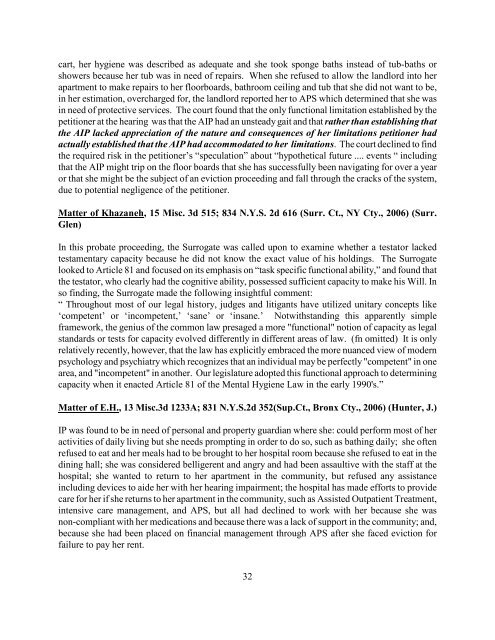MHL ARTICLE 81 - New York State Unified Court System
MHL ARTICLE 81 - New York State Unified Court System
MHL ARTICLE 81 - New York State Unified Court System
You also want an ePaper? Increase the reach of your titles
YUMPU automatically turns print PDFs into web optimized ePapers that Google loves.
cart, her hygiene was described as adequate and she took sponge baths instead of tub-baths or<br />
showers because her tub was in need of repairs. When she refused to allow the landlord into her<br />
apartment to make repairs to her floorboards, bathroom ceiling and tub that she did not want to be,<br />
in her estimation, overcharged for, the landlord reported her to APS which determined that she was<br />
in need of protective services. The court found that the only functional limitation established by the<br />
petitioner at the hearing was that the AIP had an unsteady gait and that rather than establishing that<br />
the AIP lacked appreciation of the nature and consequences of her limitations petitioner had<br />
actually established that the AIP had accommodated to her limitations. The court declined to find<br />
the required risk in the petitioner’s “speculation” about “hypothetical future .... events “ including<br />
that the AIP might trip on the floor boards that she has successfully been navigating for over a year<br />
or that she might be the subject of an eviction proceeding and fall through the cracks of the system,<br />
due to potential negligence of the petitioner.<br />
Matter of Khazaneh, 15 Misc. 3d 515; 834 N.Y.S. 2d 616 (Surr. Ct., NY Cty., 2006) (Surr.<br />
Glen)<br />
In this probate proceeding, the Surrogate was called upon to examine whether a testator lacked<br />
testamentary capacity because he did not know the exact value of his holdings. The Surrogate<br />
looked to Article <strong>81</strong> and focused on its emphasis on “task specific functional ability,” and found that<br />
the testator, who clearly had the cognitive ability, possessed sufficient capacity to make his Will. In<br />
so finding, the Surrogate made the following insightful comment:<br />
“ Throughout most of our legal history, judges and litigants have utilized unitary concepts like<br />
‘competent’ or ‘incompetent,’ ‘sane’ or ‘insane.’ Notwithstanding this apparently simple<br />
framework, the genius of the common law presaged a more "functional" notion of capacity as legal<br />
standards or tests for capacity evolved differently in different areas of law. (fn omitted) It is only<br />
relatively recently, however, that the law has explicitly embraced the more nuanced view of modern<br />
psychology and psychiatry which recognizes that an individual may be perfectly "competent" in one<br />
area, and "incompetent" in another. Our legislature adopted this functional approach to determining<br />
capacity when it enacted Article <strong>81</strong> of the Mental Hygiene Law in the early 1990's.”<br />
Matter of E.H., 13 Misc.3d 1233A; 831 N.Y.S.2d 352(Sup.Ct., Bronx Cty., 2006) (Hunter, J.)<br />
IP was found to be in need of personal and property guardian where she: could perform most of her<br />
activities of daily living but she needs prompting in order to do so, such as bathing daily; she often<br />
refused to eat and her meals had to be brought to her hospital room because she refused to eat in the<br />
dining hall; she was considered belligerent and angry and had been assaultive with the staff at the<br />
hospital; she wanted to return to her apartment in the community, but refused any assistance<br />
including devices to aide her with her hearing impairment; the hospital has made efforts to provide<br />
care for her if she returns to her apartment in the community, such as Assisted Outpatient Treatment,<br />
intensive care management, and APS, but all had declined to work with her because she was<br />
non-compliant with her medications and because there was a lack of support in the community; and,<br />
because she had been placed on financial management through APS after she faced eviction for<br />
failure to pay her rent.<br />
32

















